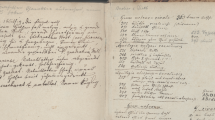Abstract
AT a lecture given recently in Cambridge by Prof. Okey my attention was directed to a passage written by Galileo in 1623 in which this pioneer of scientific method attacks the doctrines of the classical philosophers with his usual irony and vehemence. I refer to a section of his “Il Saggiatore,” in which Galileo replies to his contemporary Sarsi, who had quoted Suida to the effect that the Babylonians used to cook eggs in an emergency and when no fire was available, by rapidly whirling them in slings. (“Babylonii iniecta in fundas ova in orbem circumagentes, rudis et venatorii victus non ignari, sed iis rationibus quas solitudo postulat exercitati ‘etiam crudum ovum impetu illo coxerunt.’” Suida, Lessicografo. Bizant., x.)
This is a preview of subscription content, access via your institution
Access options
Subscribe to this journal
Receive 51 print issues and online access
$199.00 per year
only $3.90 per issue
Buy this article
- Purchase on Springer Link
- Instant access to full article PDF
Prices may be subject to local taxes which are calculated during checkout
Similar content being viewed by others
Author information
Authors and Affiliations
Rights and permissions
About this article
Cite this article
HARRIS, L. A Biochemical Discovery of the Ancient Babylonians. Nature 111, 326–327 (1923). https://doi.org/10.1038/111326c0
Issue Date:
DOI: https://doi.org/10.1038/111326c0
Comments
By submitting a comment you agree to abide by our Terms and Community Guidelines. If you find something abusive or that does not comply with our terms or guidelines please flag it as inappropriate.


